Many were hoping that with Vajpayee's NDA gone, there would be a return to the Congress normal.
Nobody was prepared for the opposite.
Sonia Gandhi was sceptical.
This became the only issue over which Manmohan Singh took on his party bosses and risked his government.
Politically, it was riskier than the 1991 reform, recalls Shekhar Gupta.

Millions of words are being written and spoken about Dr Manmohan Singh, most of these will focus on the reforms he introduced in 1991.
We can understand how his life is often seen monochromatically by his admirers -- including those who don't vote for the Congress and probably never have.
That's very unkind to him in many ways. One, it limits him and his legacy to something he had done almost a decade-and-a-half before he became the prime minister of India.
Second, it gives him sole credit for the reform, even though it was P V Narasimha Rao, then the prime minister, who carried the political risk for what was done in 1991.
That reform is, therefore, as much to Rao's credit as it is to Singh's.
And third, because it limits his legacy to this jugalbandi and denies him the place he deserves in our history for the other substantive contributions he made as prime minister.
These range from strategic and foreign affairs to politics.
When Singh became prime minister in the summer of 2004, much of the discussion was about what kind of economic agenda the UPA was going to follow.
Was he going to pick up the thread from where he and Rao had left it in 1996, or would he return to the ideology of his party and its largest parliamentary ally, the Left Front?
Even the most astute watchers of North and South Blocks were not prepared for the more substantive and historic changes to come in foreign and strategic policy.
This was especially so given the Congress's chronic suspicion of the US and the West and its persistent nostalgia for the Non-Aligned Movement and Third-Worldism.
If you had told someone on the morning of July 24, 1991, that by the afternoon, Rao would junk Jawaharlal Nehru's 1956 Industrial Policy Resolution with one speech from the industry minister preceding the Budget (Rao held the industry portfolio), you'd have been asked to get your head examined.
You'd need to have been even more brainless in the summer of 2004 to imagine that within a couple of years, a Left-of-Centre coalition, surviving at the sufferance of the Left Front with 61 MPs, would be finalising India's first substantive treaty with the US. A strategic one, as it turned out.
This change was rooted in deep, intellectual thinking, even more so than the reforms of 1991.
Then, at least there was the alibi of a crisis, the demands of the IMF.
There was no such compulsion to reposition India strategically. That India had to warm up to the West is an idea that had been brewing since Indira Gandhi's return in 1980, when she was deeply troubled by the Soviet invasion of Afghanistan and India's strategic compulsion to back it at the UN.
She did reach out to Ronald Reagan at Cancun in 1981.
But the relationship didn't pick up pace. Rajiv Gandhi and then Rao also made some moves, but these were carefully measured baby steps.
Of course, the Soviet Union had disappeared, but suspicion and scepticism of the US were still formidable.
Atal Bihari Vajpayee made some significant moves, and was attacked by the Congress for the 'shift'.

Manmohan Singh's success lay in making the same shift much more decisively as the head of a Congress government.
It was also audacious, in my book even more so than the 1991 reform, given how little support this had within his party and among the UPA partners.
The Congress was still filled with Cold Warriors, including some of his senior-most Cabinet colleagues.
And 10, Janpath was simply not prepared for it. Nor did it see the need or compulsion.
Forget support, there was deep resistance -- even resentment -- in the foreign service bureaucracy.
Many there were hoping that with Vajpayee's NDA gone, there would be a return to the Congress normal.
Nobody was prepared for the opposite. Sonia Gandhi was sceptical and particularly trusting of the Left leaders, who saw it as an outrage and betrayal.
This became the only issue over which Manmohan Singh took on his own party bosses and risked his government.
Politically, it was riskier than the 1991 reform.
Rao did not have any party bosses to worry about then, nor did he need the Left.
In Ronen Sen, then India's ambassador to Washington, Singh found a vital ally, as he enjoyed the confidence of the Gandhi household.
For a more detailed story on this, you'll need to wait for Mr Sen's memoir, which I suspect he's in no hurry to write.
This was when he admonished India's MPs for running around 'like headless chickens'.
Ultimately, he was the one who convinced 10, Janpath, along with K Natwar Singh, the old diplomat, foreign minister, and a family confidant.
Was it worth the risk? Could the gains from it be compared with the reform of 1991?
Economic benefit is not always fungible with votes, especially when it comes to the new middle class.
The gain a strategic change brings is even less tangible. It will mean nothing in an election, unless you were able to use this to project the image of a strongman ruler adored in global capitals. Manmohan Singh wasn't designed for that.
Critics said the deal would bring no gigawatts of nuclear power. Our argument was that this deal wasn't about nuclear power.
It was about a post-Cold War strategic repositioning of India as a friend and partner of the US and the West.
That was how the course of history was changed. Mani Shankar Aiyar, stridently opposed to the deal, got it right when he told me: "At least you are honest and straightforward in saying what this deal is, and what it isn't. It isn't about nuclear power, but strategic repositioning. That I oppose."

Narendra Modi's BJP picked up the baton and ran with it, but L K Advani's was opposed to the deal.
In a 2008 interview, coinciding with the release of his memoir, Mr Advani taunted me, saying I was an even bigger supporter of the deal than the Congress.
His BJP called it an end to India's strategic autonomy and even joined hands with the Left in the vote of confidence to defeat the Congress.
We know the rest. I will take you back to two particular points Manmohan Singh made in his speech defending the deal.
One, he ridiculed Mr Advani, somewhat uncharacteristically, by saying that he forced this vote only because his astrologer told him that he was going to become the prime minister of India.
And second, he read out the immortal lines from the Tenth Guru, Guru Gobind Singh's Dasam Granth, invoking the almighty for blessings before going into battle with the enemy: 'Deh shiva var mohe keh, shubh karman te kabahun na taron/na daron ari son jab jaye laron, nischay kar apni jeet karon (O Shiva, bless me so I never flinch from doing the right thing. Fearlessly, when I fling myself into battle with the enemy, give me the strength to emerge victorious).'
It's a brilliant, stirring verse. It was also my school prayer once, in Bathinda, Punjab.
In November 2021, Prime Minister Modi used the same lines while announcing the withdrawal of the farm reform laws on the 552nd birth anniversary of Guru Nanak.
The same verse from the Tenth Guru was used to persist with a risky reform, and to withdraw one. In a way that is both spiritual and poetic -- it underlines the challenge and loneliness of the reformer in India.
By special arrangement with The Print
Feature Presentation: Aslam Hunani/Rediff.com

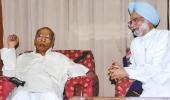
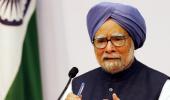

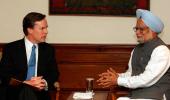





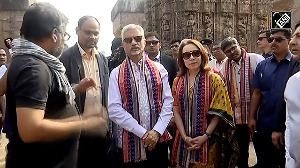
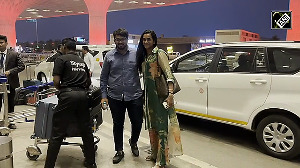
 © 2025 Rediff.com -
© 2025 Rediff.com -